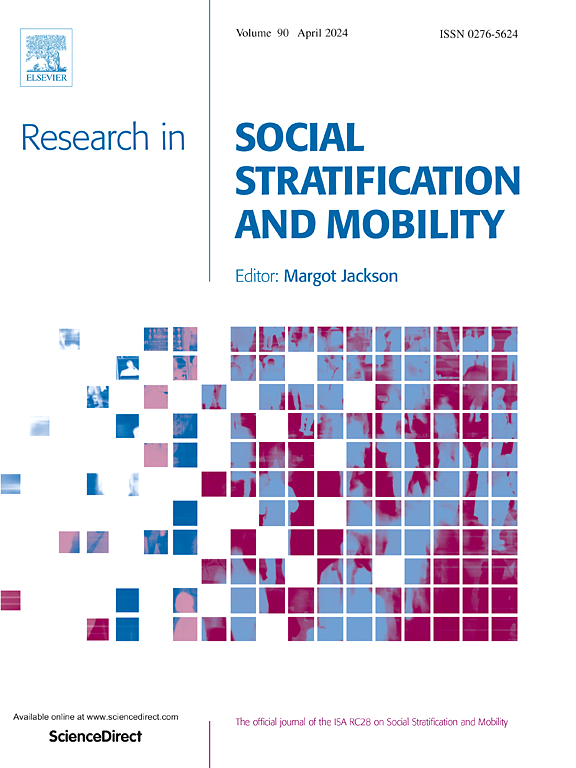Social network effects on educational inequality: The role of similarity bias in social influence
IF 2.7
1区 社会学
Q1 SOCIOLOGY
引用次数: 0
Abstract
How do social networks affect educational inequality? Previous theory suggests that inequality is reinforced by a lack of social influence between social groups, while intergroup social influence could diminish inequality. According to this view, friendships between students with different socioeconomic status (SES) might decrease educational inequality due to cross-SES social influence. An underlying assumption is that social influence occurs ubiquitously across all friendships. We challenge this assumption and suggest that friends with the same SES exert stronger influence on each other than friends with a dissimilar SES—a phenomenon known as similarity bias. We test whether similarity bias based on SES is relevant for social influence on educational aspirations using multilevel Stochastic Actor-Oriented Models on longitudinal data of 236 friendship networks in Germany and Sweden. Pointing towards similarity bias, our results show that social influence on educational aspirations is significantly stronger among same-SES friends than among cross-SES friends. Counterfactual simulations based on the SAOMs suggest that the absence of similarity bias would lead to decreases in the socioeconomic aspiration gap by up to 9 percent. We conclude that similarity bias can stabilize educational inequality even in socioeconomically mixed social settings.
教育不平等的社会网络效应:相似性偏差在社会影响中的作用
社会网络如何影响教育不平等?先前的理论认为,社会群体之间缺乏社会影响会加剧不平等,而群体间的社会影响可以减少不平等。根据这一观点,不同社会经济地位(SES)的学生之间的友谊可能会由于跨SES的社会影响而减少教育不平等。一个潜在的假设是,社会影响在所有友谊中无处不在。我们对这一假设提出了挑战,并提出社会经济地位相同的朋友比社会经济地位不同的朋友对彼此的影响更大,这种现象被称为相似性偏见。我们在德国和瑞典的236个友谊网络的纵向数据上使用多层随机因素导向模型来检验基于SES的相似性偏差是否与社会对教育愿望的影响相关。指向相似性偏见,我们的研究结果表明,社会地位相同的朋友对教育愿望的社会影响明显强于社会地位不同的朋友。基于SAOMs的反事实模拟表明,相似性偏差的缺失将导致社会经济期望差距减少多达9%。我们的结论是,即使在社会经济混合的社会环境中,相似性偏见也可以稳定教育不平等。
本文章由计算机程序翻译,如有差异,请以英文原文为准。
求助全文
约1分钟内获得全文
求助全文
来源期刊
CiteScore
7.80
自引率
6.00%
发文量
46
期刊介绍:
The study of social inequality is and has been one of the central preoccupations of social scientists. Research in Social Stratification and Mobility is dedicated to publishing the highest, most innovative research on issues of social inequality from a broad diversity of theoretical and methodological perspectives. The journal is also dedicated to cutting edge summaries of prior research and fruitful exchanges that will stimulate future research on issues of social inequality. The study of social inequality is and has been one of the central preoccupations of social scientists.

 求助内容:
求助内容: 应助结果提醒方式:
应助结果提醒方式:


